Panic is gripping Kerala after the outbreak of the deadly and rare Nipah virus that has already claimed eight lives in the Malabar region.
The disease spreads through body fluids of infected hosts who may or may not show signs of the life-threatening symptoms caused by the virus.
Tropical regions of the world, namely the Indian subcontinent, Southeast Asia, Southern China among others, are highly prone to communicable diseases.
Kerala with its abundant water bodies, tropical climate, location and high density of population has witnessed major epidemic outbreaks, especially before and after the onset of the southwest monsoons.
Here are a few deadly pathogens that Keralites need to be cautious of:
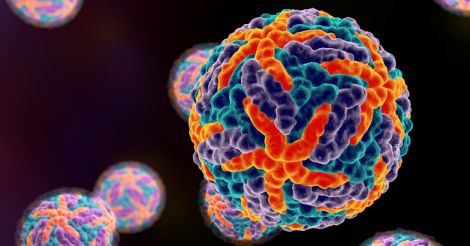 Dengue virus : Photo | IANS
Dengue virus : Photo | IANSDengue
This is a mosquito-borne tropical disease caused by any one of four closely related dengue viruses.
Dengue fever is transmitted by the bite of an Aedes aegypti mosquito carrying the dengue virus from an earlier bite on an infected human.
The disease is not contagious, i.e. it can’t be spread directly from one person to another person.
High fever, headache, vomiting, muscle and joint pains, and skin rashes are prime symptoms
Unattended, dengue can be quite a killer with its mutated virus versions that duck drug administration and can lower the vital indicators in the affected persons' body, including the critical platelet count.
Leptospirosis
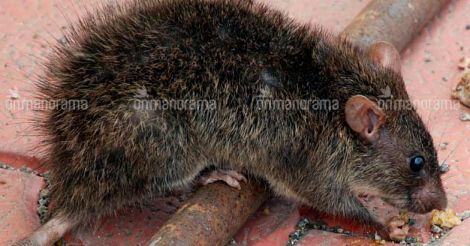 Rodents are a major cause of Leptospirosis: Photo | iStock
Rodents are a major cause of Leptospirosis: Photo | iStockIt is an infectious bacterial disease found in rodents, dogs, and other mammals, including humans.
The disease is transmitted to humans from infected animals. The bacteria often enters human body through contact with the soil or water containing the urine of infected animals.
It is caused by the leptospira interrogans bacteria.
Symptoms are highly variable and may not manifest in some cases. High fever, chills, headache, and abdominal issues causing organ dysfunction may occur.
Reported predominantly from impoverished communities in developing countries with tropical climates, limited vaccination options are available.
With its humidlity and wate logging, Kerala reports several cases of leptospirosis during monsoon.
Malaria
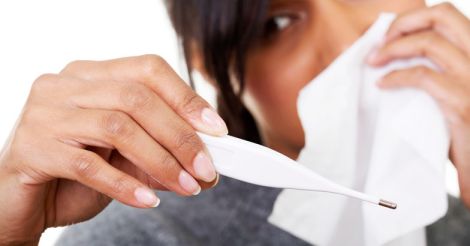
This parasitic disease is transmitted by infected Anopheles mosquitoes.
Though malaria can prove fatal, it can be cured if detected on time and treated well.
Contracting the disease could be avoided by avoiding mosquito bites; Use of insect repellents, especially at night; sleeping under a mosquito net and spraying of insecticides in bedroom are advised.
A 2017 WHO report says India has the fourth highest number of malaria cases and deaths in the world. It is still rife in tropical climates like Indonesia and Mexico, as well as parts of India and most areas of sub-Saharan Africa.
Nigeria, Congo, Burkina Faso and India together accounted for 58 per cent of the 4,45,000 deaths caused by malaria in 2016.
The incidence of malaria has been low in Kerala for a long time, but some districts (Thiruvananthapuram, Kasaragod, Kozhikode, and Malappuram) had reported several cases in the past few years.
Migrant labourers and frequent travellers outside Kerala better be alert.
Hepatitis A

This inflammatory disease of the liver is caused by a virus.
One gets infected only by drinking contaminated water, and hence highly contagious if the quality of water is suspect.
Hepatitis A is common across the globe, though Western Europe (except Portugal), Australasia and North America are exceptions.
Though, one-time vaccination against Hepatitis A offers protection for up to a year. A repeat vaccination may offer immunity for 25 years.
The cases of this low-risk liver disease are rising in Kerala, with the increasing pollution of water bodies.
Typhoid
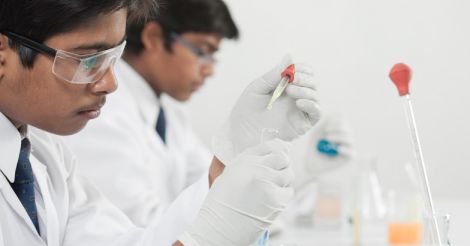
It is an acute illness caused by bacteria that grows in the intestines and blood.
Typhoid spreads through the consumption of food or water contaminated with human waste, namely the faeces of an infected person.
Typhoid vaccines are available as an injection and in a pill form. The former protects one from the disease for up to three years; but the pill provides immunity for only one year.
Vaccines are effective, but still one should ensure that food is cooked properly and use water that is boiled at least a minute before drinking.
Areas with poor sanitation and lack of clean drinking water are high risk. Ex: Papua New Guinea, Mauritania and Madagascar are risk zones.
As the number of eateries with poor hygiene rise in Kerala, regular patrons are vulnerable to the disease.
Meningitis
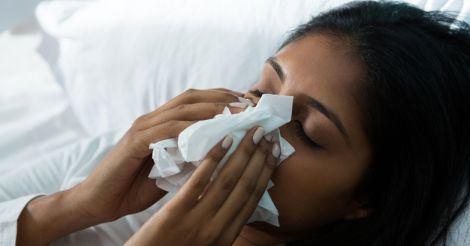
There are both viral and bacterial meningitis. This contagious disease is spread through close contact with infected people.
While viral meningitis pose only low risk, bacterial meningitis is deadly. The former requires treatment with over-the-counter medicine, but the latter calls for immediate medical attention and use of strong antibiotics.
Initial symptoms include nausea, neck ache, vomiting and rashes that appear suddenly.
The patient with bacterial meningitis can slip into a life-threatening coma if treatment is delayed. Permanent damage to the brain or nerves is likely.
Children below 5 years age are more susceptible to viral meningitis and those under 20 are highly likely to get bacterial meningitis.
Vaccinations are now available to prevent certain types of meningitis, though it is prudent to avoid congested places that have reported meningitis outbreaks.
The high risk zone is the notorious meningitis belt in Africa. It extends from from Senegal to Ethiopia.
Meningitis cases are reported in Kerala.
Rabies
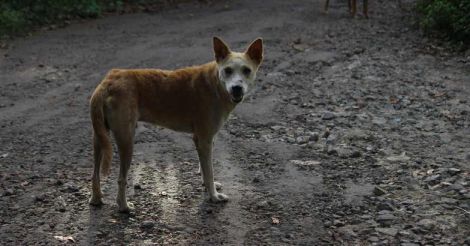
This fatal neurological disease is spread by animals carrying the deadly virus in their saliva.
It may occur to anyone in any part of the world if bitten by rabid animals like dog, cat, foxes, raccoon, bats, etc.
Those infected show early symptoms like fever and tingling where the animal has bitten.
Kerala, which is reporting severe stray dog menace, should be on high alert.
Cholera

It is an infectious water-born disease that causes 'severe watery diarrhoea, extreme loss of fluid and electrolytes, and severe dehydration'. Vomiting bouts and muscle cramps are other symptoms.
Areas with poor basic sanitation facilities like urban slums and make-shift camps for refugees as well as places reeling under natural disasters and wars are prone to it.
Cholera can even become an epidemic. It was reported from coastal areas of Kerala until the 1980s.
The disease is caused by the bacterium Vibrio cholera (V. cholera)
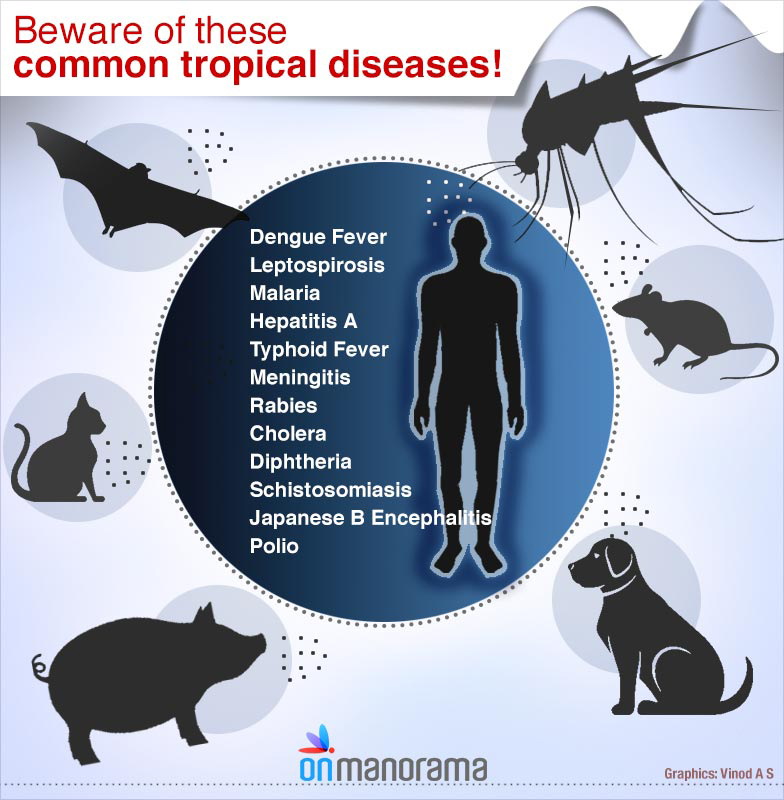
Schistosomiasis
It is commonly known as bilharzia or snail fever
This chronic parasitic disease is caused by parasitic flatworms called schistosomes which live in water bodies like lakes, rivers, waterfalls and dams.
Often the urinary tract or the intestines of the infected may be infected.
The disease is manifested in the form of cough, rash, fever, and blood in the stool or urine.
Africa, parts of the Caribbean, South East Asia and the Middle East are highest risk areas.
Alarmingly, the presence of schistosoma worm has been found mainly in cattle and water buffalo and negligibly in goats in Kerala.
Japanese B Encephalitis
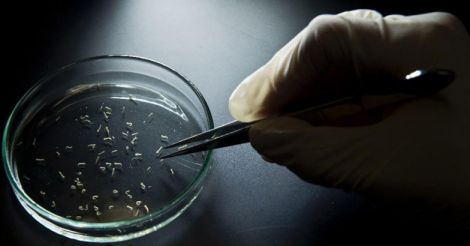
It is a viral disease transmitted by mosquitoes, which often breed in paddy fields which are aplenty in tropical regions, chiefly in south-east parts of Asia and the western Pacific.
It can be dangerous as most infections don't result in palpable symptoms, though brain fever may occur in a few cases and patients experience headache, vomiting, fever, confusion, and seizures
Pigs and wild birds are carriers of the virus.
As the number of pig farms shoot up in Kerala, there is cause for worry.
Polio
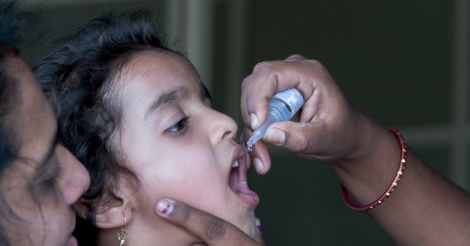
Poliomyelitis or polio is an infectious disease caused by the poliovirus that attacks the nervous system and results in "irreversible paralysis in a matter of hours" in a few cases.
It is a highly contagious disease mostly affecting children younger than 5 years of age.
The virus is transmitted by person-to-person contact, mainly through the faecal-oral route. It can also enter humans through contaminated water or food.
Early symptoms include fever, fatigue, headache, vomiting, stiffness in the neck, and pain in the limbs.
It is still prevalent in Nigeria, and parts of India, though Kerala claims to be free of it.
There is no cure for polio, though it can be prevented by immunization.
Diphtheria
Diphtheria is caused by the Corynebacterium diphtheriae bacterium.
Affects mostly children and spreads from person to person, usually through respiratory droplets, like from coughing or sneezing.
Touching open sores (skin lesions) or clothes or toys used by the affected can also cause infection.
It is dangerous when toxins released by certain bacteria kill healthy cells in the respiratory system and infects blood stream to damage vital organs.

























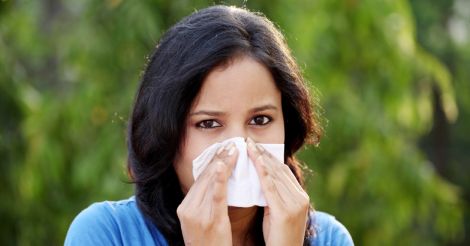 Every pre-monsoon epidemic outbreak has claimed several lives in Kerala and created critical health emergencies in the state: Photo | iStock
Every pre-monsoon epidemic outbreak has claimed several lives in Kerala and created critical health emergencies in the state: Photo | iStock